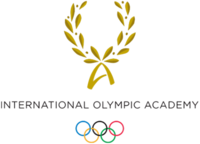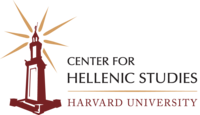10th International Scholars' Symposium on Sports, Society, & Culture
in honor of the Bicentennial of Greek Independence
Symposium Program
October 2 – October 9, 2021
6:00pm EET / 11:00pm EDT
Video-recorded presentations
Participants will be offered 7-day access to the video lectures/short presentations given by this year’s speakers on the topic of the Symposium. Videos will be made available to the participants by link on October 2 at 6pm EET and will remain accessible until the beginning of the Symposium.
This talk will explore the complicated history of the ancient marathon race and its relevance today. At the core of the marathon myth is the death of a soldier in the moment of victory. As this paper will argue, the death of the ancient marathon runner parallels both the heroic warrior’s death in battle, and it also finds parallel with many ancient accounts of athletes who have died at the moment of victory. The story of the ancient Marathon thus brings together the symbolic life and death struggle of athletics with the actual life and death struggle of war. What the story of the ancient marathon runner ultimately represents, I suggest, is a drive for transcendence that is both biological and metaphysical. That is to say, the marathon race represents a desire to go beyond the body in the struggle for absolute freedom. It is this larger metaphysical value of the ancient marathon race, which in turn has found real-life correlates in the history of modern Greece.
This paper examines the reception of the ancient Olympics in the work of Enlightenment revolutionary and intellectual Rigas Velestinlis or Pheraios (1757-98), with special emphasis on his 1797 Greek translation of P. Metastasio's 1733 libretto for the opera Olympiad as well as his contribution to the Greek edition of J. Barthélemy's 1788 fictional travelogue Travels of Anacharsis the Younger in Greece. By exploring Rigas' rendering of eighteenth century European perceptions of ancient Olympia, this discussion identifies the multi-faceted significance he attributed to the Olympic Games as a source of inspiration for the identity formation of his contemporary Hellenes. Furthermore, this analysis contextualizes Rigas' discourse on the Olympics within his strong belief on democratic Enlightenment, which he considered vital for the development of a Panhellenic historical consciousness in the modern era. Infused with profound enthusiasm for the classical past and rooted in fondness for his native Thessaly, Rigas' vision for Greek Independence grants Olympia a prominent place on the map of the future Greek state, also foreshadowing notions of Olympic revival.
Pierre de Coubertin, the founder of modern Olympics, saw in sport a kind of religion, in which the collectivity celebrates itself through its athletic achievements. This talk will examine the many ways in which sport sacralizes, glorifies, but also provides an image of, the nation. By an examination of specific examples from recent Olympic games and major athletic competitions, we will analyze how national teams are seen as reflections of the nation, how sport rituals provide occasions for national imagination, and the interplay between religious, national, and athletic narratives.
This presentation explores the relationship between sport and democratization. Ancient Greece was the first known society to create formalized democratized governmental institutions and the first known society with mass sport, that is, a situation in which sport is regularly played and watched by large numbers of individuals from a relatively broad section of the socio-economic pyramid. Was there a connection between political democratization and mass sport in ancient Greece? Drawing on sociological and historical methodologies, I provide a framework for understanding how sport affects the level of egalitarianism in the society in which it is played. I distinguish between horizontal sport, which embodies and fosters egalitarian relations, and vertical sport, which embodies and fosters hierarchical relations. I identify several mechanisms by means of which a society’s socio-political system influences how sport is played, and several mechanisms by means of which how sport is played affects a society’s socio-political system. I argue that in ancient Greece horizontal mass sport reinforced and extended socio-political democratization. Sport thus helped create freedom in ancient Greece.
Her name was Flavia Thalassia and she came from Ephesus. She won the stadion (200 meter footrace) for parthenoi at the Isolympic Sebasta Games in Naples during Domitian's reign in the late 1st c. CE. The evidence is carved in stone and clear for all to see in the recently excavated victors' lists from the games. The existence of footraces for unmarried females is well-known in the history of Greek athletics, indeed the event at Olympia that came to be called the Heraia may have been founded simultaneously with men's events there. But Flavia's case, specifically the fact that she came all the way from Ephesus and had her name engraved in stone alongside the male victors, raises new questions about ancient female athletics. What was the social purpose of these races? What virtues did the athletes display? And how were they imagined by the women who discussed them? I will attempt to explain the significance of Flavia's victory using mythology, iconography, history, literature, and philosophy. I will show the link between ancient women's sport and the virtues of independence. Finally, I will comment on the significance of these virtues for women's sports today.
October 9, 2021
6:00pm-8:15pm EET / 11:00pm-1:15pm EDT
All sessions' times displayed in EET
Opening remarks
6:00-6:15 Stamatia Dova (Hellenic College Holly Cross & CHS), Charles Stocking University of Western Ontario & CHS), and Maša Ćulumović (CHS)
Keynote presentation
Pindar the poet was a master at transcending politics in his song-making. Viewing the victories of Olympic athletes whom his songs glorified, his poetic vision took to new heights the ideals expressed by words for freedom.
7:00-7:15 Break
Group 1 moderators: Stamatia Dova, Maša Culumovic, Paul Christesen, Georgios Podaropoulos, Evangelos Tataridis, and Alexandros Velaoras
Group 2 moderators: Charles Stocking, Nicolas Prevelakis, Heather Reid, Christos Aristopoulos, Despoina Dretaki, and Paraskevi Salepi
October 10, 2021
6:00pm-8:00pm EET / 11:00am-1:00pm EDT
Group 1 moderators: (Stamatia Dova, Maša Culumovic, Paul Christesen)
Georgios Podaropoulos, Department of Classics, National and Kapodistrian University of Athens: The Poetics of Perspective on the Body in the Epinician Genre
Evangelos Tataridis, Department of Philology, University of Crete: Orestes in Olympia
Alexandros Velaoras, Department of Philology, University of Patras: Labors on the Tragic Stage
Group 2 moderators: (Charles Stocking, Nicolas Prevelakis, Heather Reid)
Despoina Dretaki, Department of Philology, University of Crete: Athletics in the Era of Peloponnesian War
Christos Aristopoulos, Department of History and Archaeology, University of Cyprus: Panhellenism and Athenian Athletics
Paraskevi Salepi, Department of Sports Organization and Management, University of the Peloponnese: The institutional environment of the National Olympic Academies and their dependence on resources



